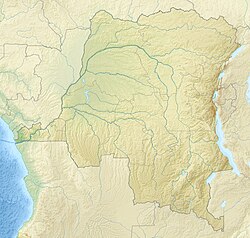Amadi, Congo
Amadi | |
|---|---|
Town | |
| Coordinates: 3°38′00″N 26°46′03″E / 3.633264°N 26.767463°E | |
| Country | |
| Province | Bas-Uélé |
| Elevation | 626 m (2,054 ft) |
| Time zone | UTC+1 (West Africa Time) |
Amadi is a town in the Bas-Uélé province of the Democratic Republic of the Congo (DRC).
Location
[edit]Amadi lies on the left bank of the Uele River where it was crossed by the RS438 road.[1] It is in the Poko Territory.[2] The Amadi clan are "zandéizéd people who speak the Zande language. They are named after a former leader.[3]
History
[edit]A Belgian exploratory column led by Willem Frans Van Kerckhoven and Jules Alexandre Milz reached the location of Amadi on 22 December 1891 where they started to build a post.[4]
Some Premonstratensian missionaries left the Ibembo mission in December 1899 and arrived in Amadi on 10 January 1900, where they founded the first Catholic mission in Haut-Uele. In 1911 the Premonstratensians ceded the eastern part of their apostolic prefecture to the Dominicans.[5] The first Dominicans arrived on 12 January 1912.[6] In 1952 Amadi was ceded to the Augustinians, who formed the apostolic prefecture of Doruma on 24 February 1958.[7] The mission of Amadi Saint-Herman today depends on the Roman Catholic Diocese of Doruma–Dungu.[8]
References
[edit]- ^ Amadi, Geonames.
- ^ Blaes 2008.
- ^ Omasombo Tshonda 2011, p. 87.
- ^ Coosemans 1946.
- ^ Omasombo Tshonda 2011, p. 119.
- ^ Omasombo Tshonda 2011, p. 120.
- ^ Omasombo Tshonda 2011, p. 121.
- ^ Omasombo Tshonda 2011, p. 118.
Sources
[edit]- "Amadi", Geonames.org, retrieved 2020-08-31
- Blaes, X. (October 2008). "Découpage administratif de la République Démocratique du Congo" (PDF). PNUD-SIG. Archived from the original (PDF) on 2010-04-01. Retrieved 2011-12-09.
- Coosemans, M. (20 May 1946), "MILZ (Jules-Alexandre)", Biographie Belge d'Outre-Mer (in French), vol. I, Académie Royale des Sciences d'Outre-Mer, pp. 697–701, retrieved 2020-08-30
- Omasombo Tshonda, Jean, ed. (2011), Haut Uele : Trésor (PDF), Le Cri édition, Musée royal de l’Afrique centrale, ISBN 978-2-8710-6578-4, retrieved 2020-08-31

